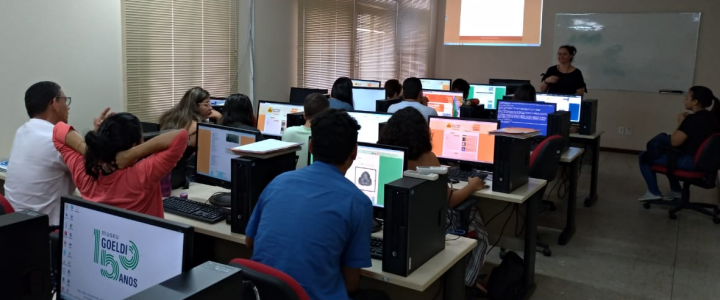Between April 01st and 05th, 2019, the “Advanced Topics in Biodiversity: Palinoecology and Pollinators Conservation” was held in the city of Belém-PA, Brazil.
The course was organized by RCPol in partnership with Dr. Marlucia Martins and the Postgraduate Program of the Museu Paraense Emílio Goeldi (MPEG), who provided us with the necessary structure to execute and receive all the participants.
The objectives of the course were to enable students, teachers and researchers to use our methodology to work with the pollen grains during acetolysis, to use the RCPol databases, as well as the tools available on our website and to contribute to the dialogue on conservation of pollinators.
We had lectures from researchers and professors: Prof. Pedro Lages Viana (MPEG), Dr. William Sabino (MPEG), Prof. Marlucia Martins (MPEG), Dr. Marcia Maués (Embrapa Amazônia Oriental) and Prof. Lea Carreira (MPEG).
Topics related to Palinoecology, pollinators interaction and data organization for insertion in RCPol databases were discussed.
Below you can read the words of Dr. Marlucia about the course:
The partnership with RCPol for the implementation of the training in collection, conservation, analysis, identification and cataloging of pollen was of extreme importance for the Postgraduate Program in Biodiversity and Conservation of the Museu Paraense Emilio Goeldi (PPGBE WWW), as well as for others students of related programs. The training also greatly benefited the project coordinated by the Goeldi Museum “How ecological interactions are influenced by mining activities and their environmental restoration efforts post-exploitation in the municipality of Paragominas, degraded area of the Brazilian Amazonian forest. – Pollination network” of the BRC consortium (https://www.brcbn.com) and the project that researches Networks of interaction between bees and fruit trees of the north and northeast Brazil (polyNet) that is being developed by EMBRAPA Eastern Amazonia in partnership with RCPOL. The course also opened the opportunity for undergraduate and postgraduate faculty and students from other institutions in Pará and Amapá, Brazil. The exchange of experience among the participants, as well as the knowledge acquired in the training course will spark Scientific Initiation, Master, Doctorate and Post doctorate research on this subject, strengthening the still incipient research groups in the northern region. Relations between the researchers and the herbarium of the MPEG was strengthened and adjustments were made for the incorporation of the pollen collection of the MPEG to the herbarium with the collaboration of RCPOL for the computerization of the pollen collection, through exchange and technical advice. As a product we aim to expand the database of the pollen catalog with greater inclusion of plant species and pollinators from the northern region. We are immensely grateful to Dr. Claudia Inês da Silva and all her team for the warm acquaintanceship, valuable scientific contribution and fruitful partnership provided through this course.
















You must be logged in to post a comment.